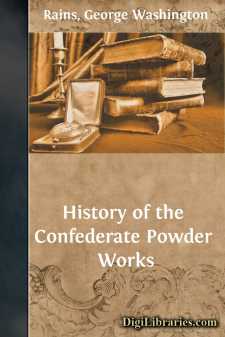History
- Africa 30
- Americas (North Central South West Indies) 50
- Ancient 68
- Asia 58
- Australia & New Zealand 8
- Canada 41
- Caribbean & West Indies 1
- Civilization 20
- Eastern Europe 12
- Europe 310
- Expeditions & Discoveries 60
- General 77
- Historical Geography 1
- Jewish 9
- Latin America 3
- Medieval 8
- Middle East 13
- Military 248
- Revolutionary 8
- Study & Teaching 5
- United States 353
- Western Europe 56
- World 13
History Books
Sort by:
by:
Jacob Abbott
Chapter I. A.D. 37Roman country seats.In ancient times, when the city of Rome was at the height of its power and splendor, it was the custom, as it is in fact now with the inhabitants of wealthy capitals, for the principal families to possess, in addition to their city residences, rural villas for summer retreats, which they built in picturesque situations, at a little distance from the city, sometimes...
more...
PROCLAMATIONS. BY THE PRESIDENT OF THE UNITED STATES OF AMERICA. A PROCLAMATION. The following provisions of the laws of the United States are hereby published for the information of all concerned: Section 1956, Revised Statutes, chapter 3, Title XXIII, enacts that— No person shall kill any otter, mink, marten, sable, or fur seal, or other fur-bearing animal within the limits of Alaska Territory or...
more...
THE COMING OF THE PILGRIMS The Pilgrims and Puritans, whose migration to the New World marks the beginning of permanent settlement in New England, were children of the same age as the enterprising and adventurous pioneers of England in Virginia, Bermuda, and the Caribbean. It was the age in which the foundations of the British Empire were being laid in the Western Continent. The "spacious times of...
more...
by:
James Stonehouse
CHAPTER I. I was born in Liverpool, on the 4th of June in 1769 or ’70. I am consequently about ninety-three years old. My friends say I am a wonderful old man. I believe I am. I have always enjoyed such excellent health, that I do not know what the sensation is of a medical man putting his finger on my wrist. I have eaten and drunk in moderation, slept little, risen early, and kept a clear...
more...
Fellow-Citizens of the Senate and House of Representatives: I embrace with great satisfaction the opportunity which now presents itself of congratulating you on the present favorable prospects of our public affairs. The recent accession of the important state of North Carolina to the Constitution of the United States (of which official information has been received), the rising credit and...
more...
CHAPTER I THE FOUNDATIONS OF ENGLAND 55 B.C.—A.D. 1066 "Ah, well," an American visitor is said to have soliloquized on the site of the battle of Hastings, "it is but a little island, and it has often been conquered." We have in these few pages to trace the evolution of a great empire, which has often conquered others, out of the little island which was often conquered itself. The mere...
more...
CHAPTER I. War With Russia: Pultusk. Poland and the Poles — The Seat of War — Change in the Character of Napoleon's Army — The Battle of Pultusk — Discontent in the Grand Army — Homesickness of the French — Napoleon's Generals — His Measures of Reorganization — Weakness of the Russians — The Ability of Bennigsen — Failure of the Russian Manœuvers — Napoleon in Warsaw....
more...
by:
Edward Gleichen
In accordance with the order received at Belfast at 5.30 P.M. on the 4th, the 15th Brigade started mobilizing on the 5th August 1914, and by the 10th was complete in all respects. We were practically ready by the 9th, but a machine-gun or two and some harness were a bit late arriving from Dublin—not our fault. Everything had already been rehearsed at mobilization inspections, held as usual in the...
more...
CHAPTER I—THE CRUSADERS IN EGYPT The Ideal of the Crusader: Saladin's Campaign: Richard I. in Palestine: Siege of Damietta: St. Louis in Egypt: The Mamluks: Beybars' Policy. The traditional history of the Christian Church has generally maintained that the Crusades were due solely to religious influence and sprang from ideal and moral motives: those hundreds of thousands of warriors who went...
more...
In accepting your invitation to address you on the general history of the Confederate Powder Works, I do so with some hesitation, on account of my close personal connection with a subject which absorbed my thought, time and energies. In the history of a war we find, generally, but little reference to the manufactories engaged in the preparation of material; they had been previously established, and...
more...











